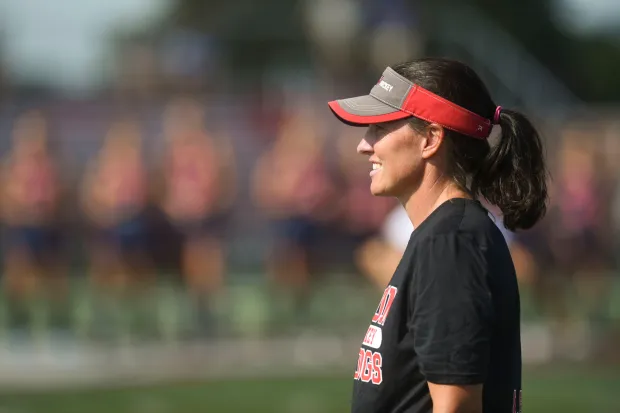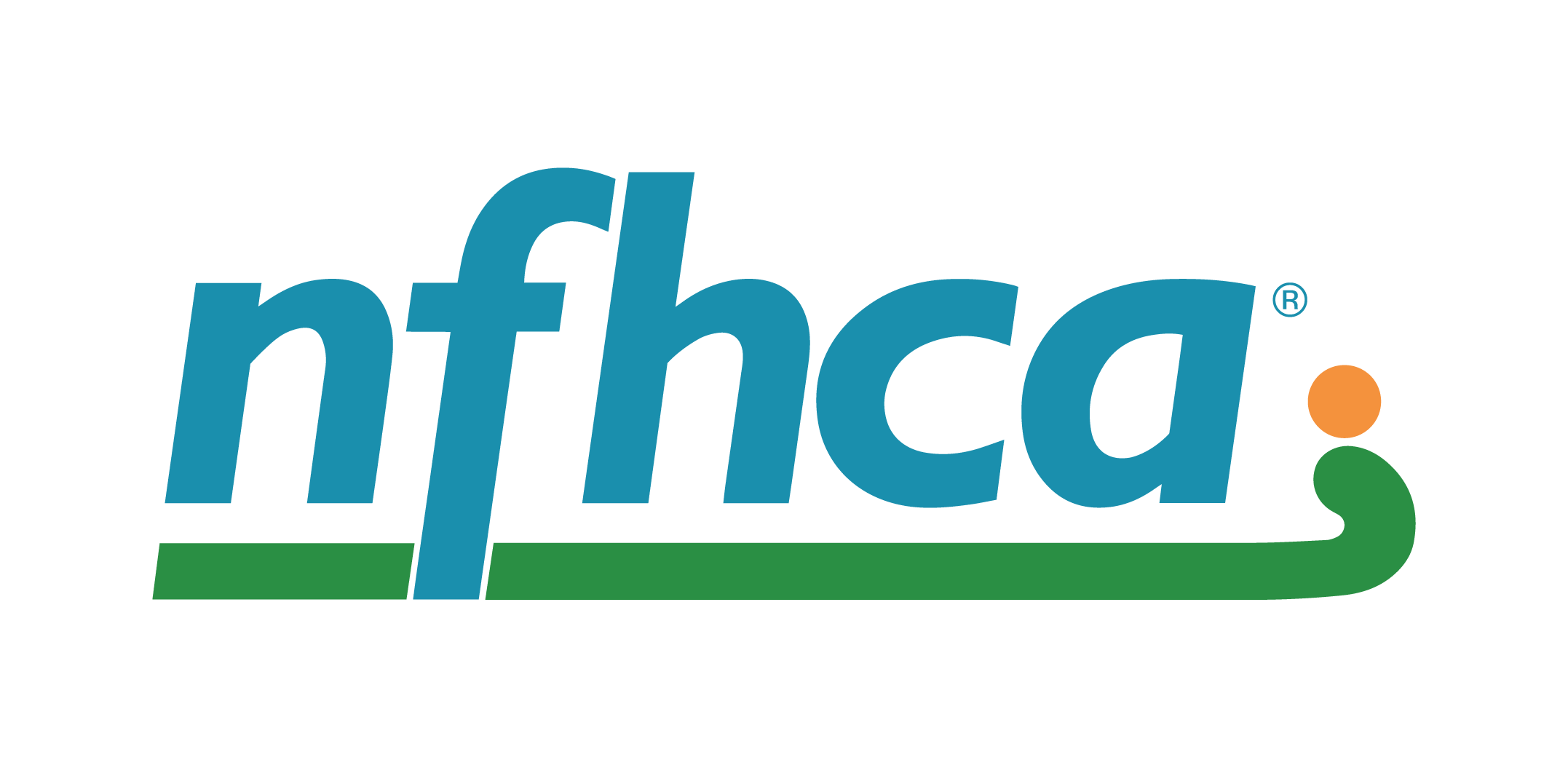Empowering Field Hockey’s Future through Service and Mentorship

By Kelly Blackhurst, NFHCA Awards & Digital Communications Manager
In our Quarterly Spotlight, we bring attention to individuals who exemplify extraordinary dedication to service within the National Field Hockey Coaches Association (NFHCA). Today, we are excited to highlight the journey of Kim Underwood, a passionate scholastic head coach at Wilson High School, PA, and a prominent member of the NFHCA All-American Committee. Through her unwavering commitment and invaluable experiences, Underwood has made a lasting impact on the field hockey community. Let’s dive into her insights and the lessons she has gained along her coaching journey.
Q: What inspired your involvement in promoting field hockey at the national level through the NFHCA All-American Committee, and what impact do you hope to achieve in this role?
A: I am heading into my 19th year coaching at Wilson High School, PA (my first 5 years were at the Middle School level), and I have always believed that if there is a need, it is important to step up and help. I first became involved at the state level with the post-season awards and then became more involved at the national level when they asked for volunteers. I enjoy connecting with other coaches and supporting the players who have worked hard to earn post-season accolades.
Q: What are the most rewarding aspects of working with young athletes as a scholastic head coach, both on and off the field?
A: I love having the opportunity to coach all levels of field hockey and specifically teaching them life lessons. I started a youth program 15 years ago, and I enjoy working with a 1st grader to help her understand how to hold a stick and be a good teammate as much as I do my high school players. I teach them leadership skills along with fundamentals that will prepare them for the next level of play. It is so rewarding to see a young person’s character develop.
Q: In your opinion, what are the significant challenges currently faced by scholastic field hockey programs? How do you suggest addressing and overcoming these challenges?
A: A scholastic coach today is required to fill so many different roles, and it takes a decent amount of time. You are not just their field hockey coach. You have to understand the game and how fluid it has become, but even more so, you need a deep understanding of their mental health and the needs that young people have today emotionally and mentally. There are also so many opportunities outside of the scholastic season that you need to help them navigate for skill growth and the recruiting process. I often tell young coaches to use their resources and work hard to develop the game with the youth in their communities. It is also important to develop healthy communication with parents because they play a much bigger role with today’s athletes, and you need to work together.
Q: Could you share a memorable coaching moment that has shaped your coaching philosophy and had a lasting impact on you or your players?
A: Some of my most memorable moments have been created by the athletes who do not stand out as huge impacts athletically but have been great teammates. I did not do a great job early on of making sure everyone felt valued, but I believe it is imperative to make sure everyone knows they have strengths that help create the dynamic team culture we are striving for each season. My vision has always been to develop women of character through the sport of field hockey, and staying true to that goal keeps me grounded and reminds me how the life lessons are so much more important than the wins and losses.
Q: What motivated you to become a Campfire Mentor and dedicate your time and expertise to mentoring other coaches? How has this mentorship program benefited you personally and professionally?
A: I have been so fortunate to have been surrounded by great coaches throughout my life who have left an impression on me. I also know that it is important to keep growing as a leader, and I figured being involved with the Campfire Mentorship Program would allow me to learn from others while encouraging coaches with all of the things I have learned over the past 20 years. I have met some amazing coaches who continue to encourage each other in field hockey and everyday life.
Q: What advice do you frequently give to other coaches navigating the complexities of the coaching profession as a Campfire Mentor? What important lessons have you learned along your coaching journey that you believe are worth sharing?
A: The best advice I can give is to hold on to your values and your goals. Parents can be really tough, and if you are coming from a place of integrity and good intention, trust yourself and your decisions. I read coaching and leadership books, follow others on social media that inspire me, and observe a lot of coaches so I can take away what I see is working and what is not working. I try to surround myself with great assistant coaches.
Q: Based on your extensive experience in field hockey, what key qualities or skills do you believe contribute to the success of a coach? How do you strive to embody those qualities in your own coaching style?
A: The best quality you can express as a coach is just loving the kids and wanting what is best for them on and off the field. I want my players to gain confidence, learn how to work with others, understand what it means to be committed, work harder than the next person, and ultimately know that I am here to support them in any way possible. Teaching them the fundamentals of the game is obviously important, but if they are more prepared for life after being part of my program, then it was a success.
Q: Can you discuss any initiatives or projects you have been involved in to increase participation and accessibility to field hockey, particularly for underrepresented communities or individuals?
A: I stated earlier that I developed a youth program in our area 15 years ago when we realized young kids didn’t have the opportunity to learn the game in our area. Over those 15 years, we have invited players from all over the area to be involved in our program. We help out families that cannot afford equipment or the registration fee. I have also run a youth camp for 19 years that is open to players of all levels and with a variety of needs. Coaching youth hockey, working with two different amazing club programs, running a camp, helping with Futures (now Nexus) for years, and now being involved in a mentorship program are all so rewarding because people’s lives are impacted, as well as my own.
Kim Underwood’s journey as a scholastic head coach, NFHCA All-American Committee member, and Campfire Mentor exemplifies the profound impact an individual can have on the field hockey community. Through her dedication, she has created a legacy of mentorship, inclusivity, and character development. As we celebrate her coaching journey, let us remember the valuable lessons she imparts and strive to make a difference in the lives of those we encounter in our own coaching journeys.
NFHCA Blog Disclaimer
All content on this blog is for informational purposes only and should not be interpreted as a substitute for NCAA compliance or legal advice. The NFHCA recognizes that the accuracy of the content and opinions in this blog may change over time. The blog site may contain links to other websites or content belonging to or originating from third parties. Such external links are not monitored or endorsed by the NFHCA and the NFHCA does not control such external websites or their content. The NFHCA will not be held responsible for the content of any message from external websites or contributing authors.
The National Field Hockey Coaches Association (NFHCA) is a nonprofit organization serving field hockey coaches and supporters of the game from across the United States. The mission of the organization is to champion, strengthen, and celebrate field hockey coaches and the game. The NFHCA strives to cultivate and recognize the professional contributions of its membership and to foster and promote the growth of the sport. The NFHCA is responsible for providing a recognizable presence and voice in regard to legislation affecting the sport as well as interscholastic and intercollegiate programs.
